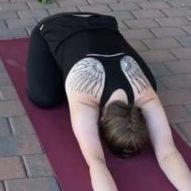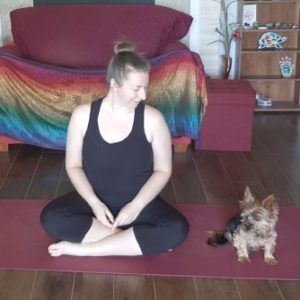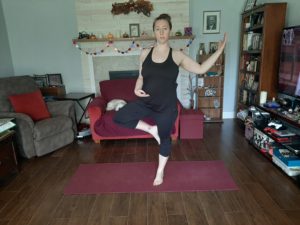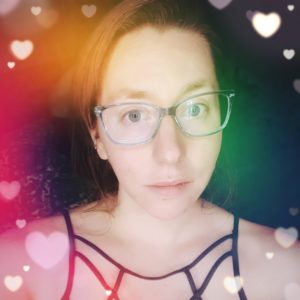MEET YOUR TEACHER
Rose is Wyoming based yoga teacher and artist with 10 years as a yoga practitioner and 3 years experience teaching. I am specialize in hatha, restorative, yin yoga and chair yoga. I completed my 200-hour yoga teacher training certification in 2021.
CLASSES ARE HELD WEEKLY ONLINE ON SUNDAYS AT 10 AM MST/MDT AND TUESDAYS AT 5:30 PM MST/MDT
CLICK TO SIGN UP FOR CLASSES HERE
There will be an IN-PERSON ONLY CLASS on JUNE 11th, 2023 for Laramie Pridefest that is a fundraiser for Laramie Pridefest.

WEEKLY CLASSES
- MELLOW FLOW – This is a beginner-friendly Hatha flow where we slowly build on range of motion meant to decompress stress and improve flexibility. This class is appropriate for all experience levels.
- TUESDAYS AT 5:30 PM MST
- SIGN UP HERE
- POWER FLOW – This a 1-hour class designed at a faster pace that focuses on strength and core building and generating heat. This is beginner and intermediate friendly.
- SUNDAYS AT 10 AM MST
- SIGN UP HERE
CLASSES BY REQUEST
- CHAIR YOGA – This class is held by request, great for individuals with disabilities that severely limit mobility and the elderly, this yoga is designed
- YIN YOGA – In Yin Yoga, only passive poses are used and held for a longer duration of time. The poses can be held for 1-5 minutes. The use of muscles is kept to a minimum, so the muscles are gently engaged to hold the posture without any extra effort. As the poses are to be held for a longer duration, the use of props like cushions, bolsters, etc., is encouraged. With the long holds, we stretch and stimulate the layers of fascia in our body.

YOGA PHILOSOPHY: YOGA IS FOR EVERY BODY
As a disabled person and former fat individual I know how challenging and daunting going to studios or large classes can be, especially if you do not have the Eurocentric idea of the “yoga look.” While there are many YouTube tutorials, as a beginner it is hard to figure out who to pick and if they will actually give modifications. Additionally, it is simply human nature to struggle to adhere to exercise based purely on “motivation,” classes that factor in identity, choice, cost, venue, personal touch and social support dramatically improve our ability to stick with an activity. This is why I practice small and private classes over Google Meet or hold small classes of 3 at my in-home studio, and in public places such as the park over the summer. My classes are priced on a sliding scale and focus on correct form, adding necessary modifications, and teaching how to sincerely listen to our body’s needs.
Many rigorous meta studies have looked into the effectiveness in decreasing chronic pain, decreasing stress and anxiety, and short term improvement in the severity of depression, proving it a popular option for medical professionals and randos on the internet to suggest as a measure for improving quality of life. It is ABSOLUTELY a myth that yoga is curative for chronic pain or depression, however, there is significant data proving is effectiveness in improving these debilitating conditions and I can certainly testify that it has improved my life tremendously. The one group that should avoid yoga are individuals with EDS as it can be extremely challenging to balance their
Yoga is an ancient art originating from northern India over 5000 years ago cited in the sacred Veda texts. The ancient art that has had increasing popularity in the United States since the 1960s and in many studios has been transformed into a pure form of exercise ripped from its deeply spiritual roots. It was important for me while getting trained as a yoga teacher to read source texts such as the Bhagavad Gita, integrate and respect the origins while integrating my own Jewish identity into my practice. I do not generally use the Hindi names for the positions as it can feel as though I’m attempting to force unearned authenticity. At the end of our practice, we will say Namaste and Shalom (a Hebrew word meaning peace, hello or goodbye) to honor its origins and integrated my identity into the practice.

HATHA YOGA
Traditionally, hatha yoga is a catchall term for any type of yoga that pairs poses (“asanas”) with breathing techniques (“pranayama”).
Nowadays, the term “hatha” has also evolved in the U.S. to describe a particular type of yoga class that’s typically slow-paced with a focus on proper alignment.
With this type of yoga, you move your body slowly and deliberately into different poses that challenge your strength and flexibility, while at the same time focusing on relaxation and mindfulness.
Hatha yoga places special emphasis on controlled breathing and posture. Building core strength, which is key to good posture, is another important aspect of this type of yoga.
Class Fees
Google Meet Class – 5 person Max – $2, $5, or $7 sliding scale fee
Private Google Meet Class – $5~$10/person sliding scale fee
In Person Class – 3 Person Max – $5~$10 sliding scale fee


